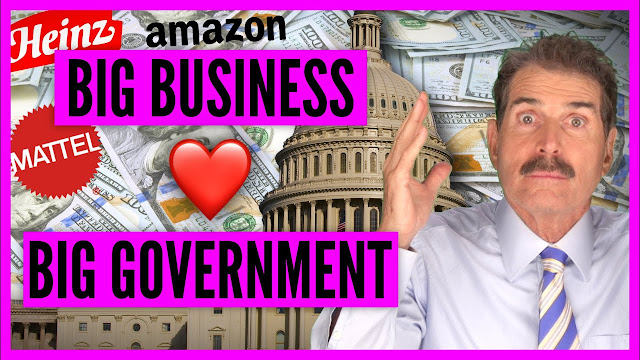I like this definition by econlib:
"Fscism is socialism with a capitalist veneer.... Where socialism sought totalitarian control of a society’s economic processes through direct state operation of the means of production, fascism sought that control indirectly, through domination of nominally private owners."
(https://www.econlib.org/library/Enc/Fascism.html)
In modern application, it's not Big Government with weak private enterprises (socialism) or Big business with weak role of the state (capitalism). Rather it is Big Government + Big Business (including big media, big tech) marriage.
(this photo, John Stossel, https://www.youtube.com/watch?app=desktop&v=WrTuxc4W8gs)
Regulatory capture -- a situation where government regulators are in bed with, or in the payroll of certain business conglomerates. The regulators issue regulations and restrictions that are unfavorable to existing competitors, or dissuade potential competitors from coming in, so that Big business or conglomerate can have more control of the economy or certain sectors of the economy.
I think almost all countries in the world now are mixed economies. No more purely capitalist ones (Adam Smith, John Locke definition of limited government) like the US or UK before. No more purely socialist/communist governments like China, Cuba and Vietnam before.
More of post-WW2, modern fascism tendency and trend.
Meanwhile, in 1987 I went to Europe, my first time to set foot in that continent. I went to Amsterdam to have elaborate study of Marx, Lenin and Trotsky for 3 months when I was still a Marxist. But I've abandoned Marx since the mid 90s and embraced Adam Smith and David Ricardo. A 180 degrees shift, but slow, about 4-5 years transition. See my presentation in 2009 about my transition,
https://funwithgovernment.blogspot.com/2021/12/pol-ideology-82-reflections-of-former.html
While I was still in Amsterdam in 1987 I joined my Trotskyist friends in a big rally in Brussels NATO HQ, an anti-cold war rally (NATO vs Warsaw Pact). I wondered years after, why Marxists who campaign for working class revolution vs capitalism would be against NATO war plans, I didn't understand then.
In measurement of economic growth, I would delineate countries not whether they are largely capitalist or largely socialist. But rather how ecological socialist they are, it's clearer. Europe is where ecological socialism and central planning is strongest (decarbonization, net zero, ESG, etc), next strongest would be N. America and Japan, essentially the G7.
The less ecological socialist are largely the BRICS (Brazil, Russia, India, China, S. Africa), MidEast and ASEAN countries. Although Singapore is now following the G7 path. Degrowth is now creeping in Singapore.
-------------
See also:
Pol. Ideology 84, Capitalism and prosperity, June 28, 2022
Pol. Ideology 85, Austrian Economics and marginal utility, January 06, 2023
Pol. Ideology 86, Endless crisis narratives and authoritarianism, August 27, 2023

No comments:
Post a Comment